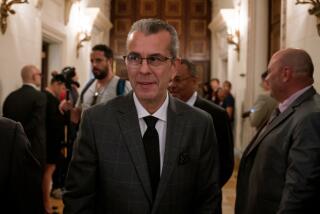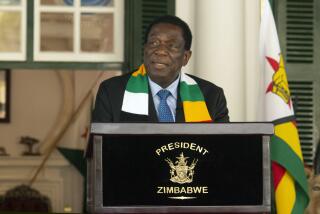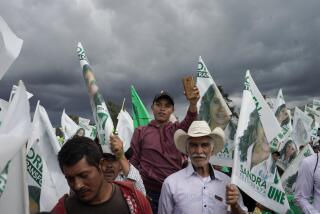Democracy, or an Exercise in Fraud?
- Share via
WASHINGTON — When the strongman who has ruled the West African country of Cameroon for more than 20 years swept to another election victory last fall, a number of observers quickly questioned the process.
International monitors led by a former Canadian prime minister said they had no confidence in the voter registration lists. Roman Catholic Cardinal Christian Tumi of Cameroon said the election, like all others in his country, was “surrounded by fraud.”
But former members of the U.S. Congress on the scene were more upbeat about President Paul Biya’s 71% landslide. “In general, the process was free,” Ronnie Shows, one of six observers from the Washington-based U.S. Assn. of Former Members of Congress, told reporters in Cameroon. “This is what democracy is about.”
The American mission was different in another way: It had been organized by an association member who also was a lobbyist for Biya’s government. The lobbyist served as the mission’s chief staffer and billed Cameroon for his work.
Biya’s government also picked up the $80,000 tab for the Americans’ visit. And a month after the group left, one of the six observers signed his own lobbying contract with Cameroon, promising to show that the country was making great strides in human rights and democracy, according to federal lobby disclosure records.
Association Executive Director Peter Weichlein defended the mission, saying it met all ethical standards and that a written report a week after the election included serious criticisms of the process. Five of the observers said in interviews that they had no problem with the lobbyist, former Rep. Greg Laughlin, playing such a key role in the mission.
But three experienced election monitoring groups contacted by The Times said their standards would bar a variety of the association’s procedures in Cameroon.
David Carroll, director of democracy programs at the Carter Center, which has monitored dozens of foreign elections, said his group did not accept funding from the government of a country where it was observing an election.
“That’s a clear conflict of interest,” he said. “So is the involvement of anyone on the delegation who has a clear financial or political interest at stake.”
A spokesman at Cameroon’s embassy in Washington said he was surprised that former members of Congress had allowed his government to pay for their trip. “It’s not normal practice,” said Richard Nyamboli. “I would think they would want to be autonomous.”
*
The association of former lawmakers was chartered by Congress in 1970 to educate the public on “the crucial importance of representative democracy” at home and abroad. Its budget last year was about $750,000, mainly from dues paid by nearly 600 members, grants and an annual fundraiser. Of the association’s 24 board members, at least 18 work or have worked as lobbyists, four of them for foreign countries.
In addition to its educational programs, the association’s activities include advising parliaments in Eastern European countries such as Poland and Ukraine.
Last year it delved into election monitoring, sending a mission to Ukraine that was funded by the Washington-based U.S.-Ukraine Foundation, an organization co-founded by the wife of newly elected President Viktor Yushchenko.
Four delegations sent July through October reported that the election process favored then-Prime Minister Viktor Yanukovich, Yushchenko’s presidential opponent. Yanukovich claimed victory in a November runoff election, but after protests in Kiev, the capital, the runoff was repeated, and Yushchenko won.
(A different group of retired members of Congress also monitored the Ukrainian election and reported that the first round in October was essentially free and fair. That group, which was not affiliated with the association, was organized and funded by three businessmen close to Yanukovich.)
In July, the Washington law and lobbying firm Patton Boggs inked a $400,000 deal to help improve ties between the U.S. and Cameroon, including on “issues relating” to the October election, federal disclosure forms show. Three Patton Boggs lobbyists, including Laughlin, traveled to Cameroon in August. Laughlin said in an interview that government officials told him they wanted Americans to monitor the vote so they could see how much progress Cameroon had made in building a democracy.
Laughlin contacted Weichlein about sending an observer mission. Weichlein told The Times that the Biya government agreed to cover expenses and that the delegation members donated their time. Association officials also met with Laughlin to discuss their concerns about a possible conflict of interest, Weichlein said.
“We sat down with him and said the mission had to be independent,” Weichlein said. “He said that was fine, the government felt it had made great strides and wanted the international community to be aware of that.”
*
Cameroon was formed by a 1961 merger between two former territories controlled by France and Britain, but the country didn’t legalize opposition parties until three decades later. Biya, who took power in 1982, won multiparty presidential elections in 1992 and 1997. Those votes were “marred by severe irregularities,” according to a U.S. State Department report issued this year.
And a separate State Department report, an annual human rights survey, says that the country’s security forces “committed numerous unlawful killings and were responsible for torture, beatings and other abuses,” and that the government “continued to arrest and detain arbitrarily various opposition politicians, local human rights monitors and other citizens.”
In the current annual survey on corruption by Berlin-based Transparency International, Cameroon is tied for 129th place out of 146 countries.
Yet for a number of years, the U.S. has maintained friendly ties with Cameroon and other energy-rich West African countries, which have become a growing source of oil imports. The U.S. bought more than $225 million in goods from Cameroon last year, mostly oil, and is one of the country’s major trading partners.
Cameroon has held one of the rotating seats on the United Nations Security Council since 2002, and it backed Washington’s attempt to pass a resolution authorizing the use of force against Iraq. Biya made his first visit to the White House on March 20, 2003, the day of the U.S.-led invasion against Saddam Hussein.
The official observer team of the former lawmakers association arrived in Cameroon on Oct. 8, three days before the vote. In addition to Shows (D-Miss.), it consisted of former Reps. Michael Forbes (D-N.Y.), Webb Franklin (R-Miss.), Andrew Maguire (D-N.J.), Richard Schulze (R-Pa.) and Joe Wyatt Jr. (D-Texas).
Laughlin, a Texas Democrat who lost his 1996 reelection bid after switching to the Republican Party, and fellow association staffer Rebecca Zylberman arrived two days earlier.
Laughlin arranged the group’s hotels and transportation and set up interviews with government officials and a briefing at the U.S. Embassy.
“We relied on Greg 100% to put the trip together,” Weichlein said.
The observers split into three groups and visited the country’s two biggest cities, Douala and Yaounde, as well as a few towns. They also met with representatives of opposition parties, interviewed election officials and visited polling stations. Laughlin did not go with the delegates to observe the actual vote.
On Oct. 12, as votes were being counted, association members spoke to the media. Even though Laughlin was not an official member of the delegation, he was identified in Cameroonian and foreign news accounts as its leader. He praised the transparency of the vote, with media accounts quoting him as saying, “The elections were conducted fairly.”
A postelection statement issued by U.S. Ambassador R. Niels Marquardt said the balloting marked “a positive step forward for this country’s evolving democracy.”
Cameroon’s pro-government media outlets gave the U.S. delegation prominent coverage.
“Voting Conduct Impresses American Observers,” the headline in the state-owned Cameroon Tribune said. According to the article, the Americans had “exalted” Cameroon’s democratic process. It quoted an unidentified team member as saying, “Cameroon is well on its way in the democratic process.”
The British Broadcasting Corp. and the Agence France-Presse news agency reported that government denials of election fraud had been backed up by former members of Congress.
The association issued a report a week after the vote that was more critical than the comments the delegation members had made in Cameroon. It includes complaints from opposition parties and reports a “significant number of irregularities,” including the media’s pro-government slant. It says that “many potential voters” had been unable to register because of their “assumed political sympathies.”
The report also says that the irregularities were not enough for the association to “disapprove of the balloting process itself.” It calls for the strengthening of the new National Elections Observatory, and says its involvement in the vote marked “an important degree of progress against the background of past elections that were not well-supervised nor widely accepted as open, free and fair.”
The report, which disclosed the Cameroon government’s funding of the monitoring mission but did not mention Laughlin’s role, acknowledged that government staffers had accompanied two of the three groups of delegates on election day. Although the officials did not limit the observers’ activities, they “did have a large role in outlining the agenda for the day,” it said.
For one team, the government staffers helped determine which polling stations would be visited. That team, in which Franklin said he was paired with Schulze, reported “no instances of complaints from individuals regarding the denial of voting rights.”
Weichlein and Laughlin both said that Laughlin had no input into the report.
“When you get funding from one side, the other side is always going to accuse you of bias, but our report was not a whitewash,” Weichlein said.
Schulze said he considered the final report too critical of Cameroon. “It now has freedom of speech, freedom of religion, freedom of assembly and a good measure of toleration,” he said in an e-mail to The Times. “There was no violence and no coercion.”
*
A group of observers from Commonwealth countries, led by former Canadian Prime Minister Joe Clark, began arriving in Cameroon about six weeks before the election. They deployed 24 monitors on the day of the vote and visited 263 polling stations across all of Cameroon’s provinces.
In contrast to the association members’ remarks to the media, the Commonwealth group released a statement when it left Cameroon that said that “in a number of key areas, the electoral process lacked the necessary credibility.”
It issued a 50-page report that also covered Cameroon’s poor human rights record and the government’s history of political violence against the opposition, topics not addressed in the 11-page American report.
In its report, the Commonwealth group said that the registration process might have “missed a considerable portion of the voting-age population of Cameroon” and that the group had no confidence in the list of those who did register. Its teams encountered complaints from people who said they had registered but whose names did not appear on the lists. Some teams reported that the complaints were “numerous and vociferous.”
“We ran into swarms of people who had been declared ineligible to vote,” Clark said.
The report added that the National Elections Observatory lacked credibility and suffered from a “lack of financial resources, staff and enforcement powers.”
Carroll said the Carter Center did not accept government help with logistics, agenda or escort.
“A prerequisite for us to accept an invitation is to have unimpeded access,” he said. “The whole idea is to be independent and your movements unknown. If officials know where you are going, they have more ability to manipulate the process.”
Clark, a member of the Assn. of Former Parliamentarians of Canada, said he had discussed the American mission with his board so “we can take steps to ensure that we don’t slip into the same type of practices” on election missions.
*
In November, just more than a month after the election, delegation member Schulze -- a member of the association’s board and a lobbyist at Valis Associates -- signed up a new client: the Biya government. In exchange for an initial retainer of $149,972, he and two other company lobbyists are to help “maximize the impact of Cameroon’s political and economic reforms on agencies and departments of the U.S. government,” according to disclosure forms.
Schulze said that after returning to the United States, he contacted some of the people he had met in Cameroon. It “was these discussions, along with our firm’s background and experience, which led to our being placed on retainer,” he said.
That same month, former Rep. Maguire wrote a sharply critical opinion piece in the Newark, N.J., Star-Ledger calling the Cameroon election an example of how “dictators masquerade as democrats.” In a subsequent interview with The Times, he defended the association’s observer mission but said that he thought it was impossible to have a free election in Cameroon.
Two other delegation members, Wyatt and Franklin, swiftly reacted to Maguire’s column. Franklin said they had worked with lobbyists Laughlin and Schulze to craft a letter to the editor that declared the election “free, fair and transparent.”
Weichlein said the association hoped to expand its election observer program in the years ahead.
“We have a unique pool of experienced legislators,” he said. “If asked, we can lend our knowledge and be extremely helpful to emerging democracies.”
More to Read
Sign up for Essential California
The most important California stories and recommendations in your inbox every morning.
You may occasionally receive promotional content from the Los Angeles Times.













